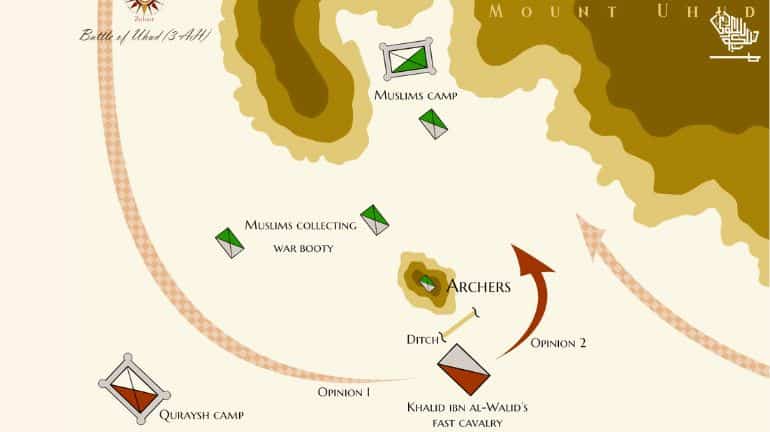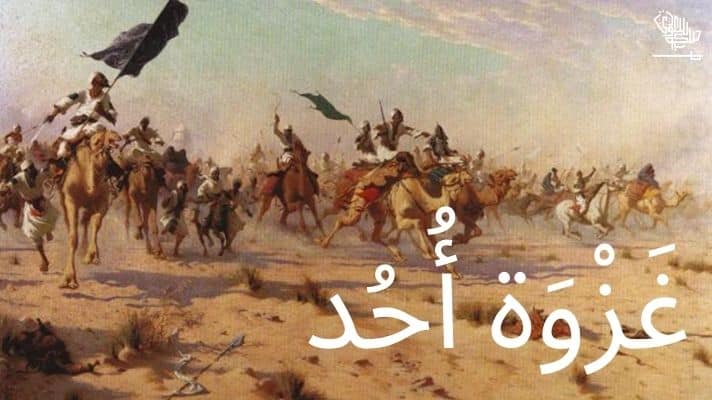The Battle of Uhud was a significant military engagement that occurred in 625 AD, during the early days of Islam. Prophet Muhammad (صَلَّى ٱللَّٰهُ عَلَيْهِ وَسَلَّمَ) led the battle between the Muslim forces and the Meccan polytheists.
Both sides fought the war along the slopes of Uhud Mountain, a historical site located just north of Medina in modern-day Saudi Arabia.
The following are 22 key historical points about the Battle of Uhud
- The battle was a Meccan retaliation after they had suffered defeat at the Battle of Badr, suffered the previous year.
- The two sides fought the Uhud battle on 7 Shawwal Hijri 3.
- Compared to the Muslim force of 700 soldiers, the Meccans had a much larger and better-equipped army of 3,000 soldiers, 200 of whom were on horseback and 300 camel riders.
- Abu Sufyan led the Meccan army.
- Hind, Abu Sufyan’s wife, led an entourage of women who came along with the army to cheer the deaths of Muslims.
- Khalid bin Waleed(رَضِيَ ٱللَّٰهُ عَنْهُ) and Ikrimah bin Abu Jahl commanded the flanks of the Meccan army. Later, both converted to Islam.
- Mundhir bi Amr (رَضِيَ ٱللَّٰهُ عَنْهُ) and Zubair bin Al-Awwam (رَضِيَ ٱللَّٰهُ عَنْهُ) commanded the flanks of the Muslim army.
- The Muslims initially had the upper hand in the battle, but a mistake made by some of the archers led to the Meccan army breaking through their lines.
- Prophet Muhammad(صَلَّى ٱللَّٰهُ عَلَيْهِ وَسَلَّمَ) sustained an injury in the battle. The battle also brought about the death of many of his closest companions.
- Despite the setback, the Muslim forces could regroup and hold off the Meccans, who ultimately decided to withdraw.
- The Muslims suffered heavy casualties in the battle, with around 70 killed and another 70 injured.
- The Meccans also suffered heavy losses, with around 50 killed and another 100 injured.
- The battle was a shortlived strategic victory for the Meccans, who had successfully defended Mecca from the Muslim invaders.
- However, the battle also significantly impacted the morale of the Muslims due to the death of many of their top leaders and fighters.
- Hazrat Hamza (رَضِيَ ٱللَّٰهُ عَنْهُ), the Prophet’s uncle, was martyred by an Abbysinniain enslaved person Wahshi bin Harb. Wahshi was Jubayr bin Muntim’s slave and promised his freedom for killing Hazrat Hamza (رَضِيَ ٱللَّٰهُ عَنْهُ).
- In another incident, the Meccans killed Musab bin Umair (رَضِيَ ٱللَّٰهُ عَنْهُ), who had a striking resemblance to the Holy Prophet (صَلَّى ٱللَّٰهُ عَلَيْهِ وَسَلَّمَ). The Meccans mistook this for a great victory but were soon disappointed when they learned of the mistaken identity.
- The battle reminds Muslims of the importance of discipline and unity in trial and conflict.
- The Uhud battle expanded support among the tribes of Arabia for the Prophet Muhammad (صَلَّى ٱللَّٰهُ عَلَيْهِ وَسَلَّمَ) and the Muslim cause.
- The battle also led to the Treaty of Hudaybiyyah, which temporarily halted hostilities between the Muslims and Meccans.
- It was also a turning point in early Islamic history. as it marked the end of the Muslims’ offensive operations and the beginning of a defensive stance.
- The Battle of Uhud is remembered as one of the most critical battles in Islamic history. Muslims still study and remember it today.
- The battle site is now a popular tourist destination, with a monument and a museum dedicated to the battle and its significance.

The Battle of Uhud was an attitude-changing event in the early days of Islam, a turning point in Muslim military operations. It reinforced the importance of discipline and unity in battle.
While the Muslims suffered heavy casualties, the conflict also expanded support for the Prophet Muhammad (صَلَّى ٱللَّٰهُ عَلَيْهِ وَسَلَّمَ) and the Muslim cause among the tribes of Arabia.
Today, Muslims remember and study the battle as an important historical event.
DISCLAIMER: The images/videos/logos showcased on this page are the property of their respective owners. We provide credit and sources wherever possible. However, If you find that your image/video is displayed on this blog without authorization, please contact us with the relevant details and a link to the image, and we will promptly address your concerns.

Faisal Malik is an accomplished author and the Chief Editor at Saudi Scoop. With a passion for delivering insightful and engaging content, he leads the editorial team, covering diverse topics that resonate with readers. His expertise in journalism and storytelling ensures high-quality, well-researched articles that inform and inspire.




